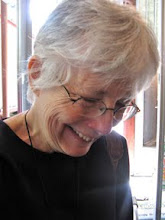Last Sunday I attended mass at my old church in Jacksonville, Florida. The new rector, who I'd just met two days before at the rehearsal dinner, sidled up to me and said "I don't really like today's lessons. Why don't
you preach the sermon?" I laughed. I actually hadn't
read Sunday's lessons yet, so I was curious to hear them, and then to see how he preached them.
Ah yes ... the vineyard owner, both versions: the original from Isaiah, and the one Jesus told as a parable. It's always good to hear his source material in context with the Gospel reading. I often forget Jesus drew from Torah for many of his stories. He didn't operate in a holy vacuum, making up everything he said from scratch.
The preacher began by talking about prescription drugs and their possible side effects... how Madison Avenue has made a killing with advertising for prescription medications of all kinds, (not just the ones to enhance your physical abilities in bed.) The theory is you'll go to your doctor and ask for the drug. If the doctor prescribes it, then you'll also get a large piece of paper with all the possible side effects: nausea, headache, diarrhea (he didn't use that word) and muscle pain. It comes down to the fact that you're betting that the meds will do their job without you having to deal with the side effects. His analogy was that everything in the lessons for Sunday dealt with choice and the side effects of those choices.
In the Isaiah vineyard story God built, planted and took great care to tend His vineyard. But instead of getting a nice crop of grapes, he got sour ones. In that version it's clear that Israel, the people, are the grapes. They've entered into a relationship with God based on a covenant, where both parties have made promises, have responsibilities. God keeps His side of the covenant and expects His people to keep theirs. But they don't. Instead they are wild grapes, a people who rebel and don't honor the relationship.
While the imagery is the same for the Gospel, it's now a case of vineyard owner versus tenants. Still, there's the underlying idea of covenant: it's his vineyard after all, and the owner expects to collect his share of the harvest. But... when he sends his servants to collect, the tenants beat them up, and some servants are actually killed. After all this, the owner says to himself, "I'll send my son. Surely they will respect him." But they don't.
Let me stop right here and spin off on a tangent. Am I the only person who's ever thought the owner is naive? These tenants have just killed his servants. He did nothing. They think the place is theirs. Why would they even hesitate to kill the son? I must be missing something historical, contextual, huge... because I don't get it.
Except of course, I do.
The analogy that God is patient and forgiving and loving and full of mercy, giving us the benefit of the doubt time after time is clear. But both these lessons have a warning. In both these stories, there's an end to the mercy. In the first, the vineyard is trashed and allowed to be overrun with weeds. In the second, it will be given to new tenants. In the early Christian movement, they probably thought they were the new tenants. A lot of us probably still think that's the case. But the truth remains that Christians behave with the same rebelliousness, greed and self-absorption as Israel did in Isaiah's time.
Our priest said, "These are hard lessons."
Why? Well, first of all nobody likes to admit guilt. "Not my responsibility" or "I didn't know." are two of the standard excuses when a catastrophe occurs. Take your pick... the latest debacle on Wall Street will do. "I'm not greedy like those guys. I'm just trying to get along in this dog-eat-dog world, make a decent living, give my kids a better life."
Except... we've all bought into some pretty lame substitutes for a better life. Our kids sit in front of TVs that tell them they'll be prettier, more popular more in... with anything and everything from designer jeans to the latest Barbie, and adults will be happier, more attractive, more successful... with a bigger house, a cushier car and prescription drugs to enhance our physical abilities in bed. We didn't have to buy that story. But we all did (and do) to some degree. So here come the side effects.
"The Kingdom of God will be taken away and given to others." In our day and age, how does that work? On Sunday, the priest had his own idea about how it happens. He thinks it won't be a drastic thing... more like erosion. Certain things lapse and ethics become lax. He wondered aloud how many people ask themselves "What does God want from me?" rather than "What do I want?" Not so many. I know that even in the convent it's an issue. We, who have given our lives to God are still plagued with the "I wants" instead of the "God wants" or even worse, we pretend that God wants what we want.
And yet, in times of disaster, it seems to me easier to hear the hard lessons, to swallow the medicine that will make us well again. We are a greedy people. Yet when that greed is paying off, who wants to hear it's wrong? Only when the house of cards begins to tumble do we buck up and get clear about our priorities. Maybe now is the best time to hear these lessons.




